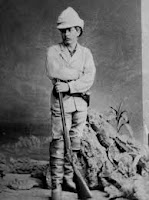I actually taught today. I covered another teacher, and pulled an old lesson off the shelf ready to go, one of those old stand-alone photocopy-in-case-of-emergency ones.
We read an old article from the Guardian, 'Mindless in Gaza' by Jack Shamash.
Shamash disparagingly does violence to the belief that 'travel' is a romantic, lofty, noble pursuit, far superior to tourism. I suppose it made me squirm as I remembered the times I've said smugly 'I've never been, nor will I ever be, on a package holiday'. (Which is actually not even true, because I paid an all-in price for a tour of the Holy Land in 2000).
I first taught this lesson in 2005, and it is one of the few articles I could instantly name as a text that has changed my attitude to something. Shamash argues that travel in fact narrows the mind.
It's meant to be provocative, and it is. Comfy old views are poked and jibed for a reaction. Clever examples are selected as supporting evidence: days chewed up looking for the cheapest hostel, tedious pontification by the travel-wise about how to haggle prices right down, uncomfortable journeys alongside people who are obviously in constant motion because they're avoiding real life back home ... Huh. At least tourists are honest about their motives, and are probably much less self-aggrandizing, argues Shamash.
One example left me pondering during the first flush of my teaching career, and still has me perplexed. Look back at the quote above, the paradox that noble Travellers experience poverty a thousand miles away but ignore grim reality a mile and a half down the road.
'I just had to get out there and see the poverty for myself.' Heard (or said) that before?
Why?
We see it on TV. Isn't that enough? Do we have to smell poverty as well?
Do we confuse 'poor' with 'cosy, simple and rustic', thinking we're going to experience the Good Life? 'They're poor, but oh so happy' - that's what the national romantic artists depicted and it made the establishment all the more secure that people have their allotted place in life and shouldn't move beyond their station.
Is it neo-colonialism? A saviour complex? A chance to live like royalty with tiny prices, and a feeling that all my shopping for textiles and trinkets is 'making a difference'? (Disparaging? Eat your heart out, Jack Shamash!)
I don't know what the answer is, but feel free to comment! (Seriously, please comment!)
Sarah and I have both gone on short term mission trips, mainly to Latin America. There's no doubt that the experiences have marked us, and our connections with the communities we stayed with are an important part of our marriage. Bolivia, in particular, will always be part of us.
Why did we go? I don't have a big catch-all reason. Maybe I thought when I was 21 that I could save the world, but when I returned aged 30 I definitely didn't think that any more. In fact, I went wondering what on earth little I could possibly do.
I suppose I half-expected 'poor' Latin America to be 'poor but happy', which is largely true, but of course that's no reason for it to remain economically disadvantaged. And I was as seduced as the next gringo at enjoying the sudden rush of affluence when I exchanged pounds for pesos.
It's not that hard these days to go to other continents and see the poor. It's much harder, I suppose, to come back home a changed person and especially to remain a changed person, having seen poverty first hand. For myself, returning to Ireland was definitely Plan B. But here's the challenge ...
... to be prophets in our own homes.
How often has the same passion to see poverty (and implicitly, I hope, challenge it), ever moved me to take a walk around deprived streets in my own town? It seems easier to be a socialist on Che's own patch, and more attractive to be a missionary in sunnier climes.
There's poverty here too. Economically, of course, and socially too. We're much poorer here than in Latin America in lots of ways.
We come home, the tan fades (in my case, the sunburn peels). Hopefully, though, other changes might last.
If you went on a mission trip or gap year, it would be great to hear your comments on why you went, what you did and how it affected you.
'Fra Hardanger', by Gude. An example of a beautiful national romantic painting that, wittingly or not, expresses how happy the simple, rural poor are when they remain at their station in life.
More from Jack Shamash at www.jackshamash.com
Want to read more? http://books.google.co.uk/books?id=U0uTvmEcbSEC&pg=PA78&lpg=PA78&dq=jack+shamash+mindless+in+gaza&source=bl&ots=G9io1PBaVB&sig=FRZz67HsCrPbciHRaGkbskweCQ8&hl=en&sa=X&ei=QeQbUJCdFYKe0QWAzYHYCA&ved=0CE0Q6AEwAA#v=onepage&q=jack%20shamash%20mindless%20in%20gaza&f=false


Great stuff - how about a compare and contrast between the economics of Deuteronomy and of the early church in Acts?
ReplyDeleteSorry, techie incompetence, this comment took a wrong turning in cyberspace!
ReplyDelete